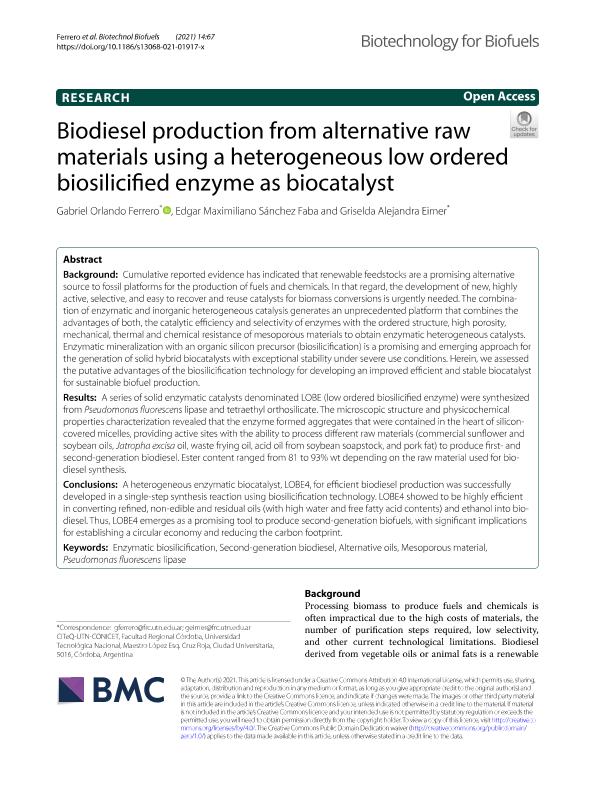Mostrar el registro sencillo del ítem
dc.contributor.author
Ferrero, Gabriel Orlando

dc.contributor.author
Sánchez Faba, Edgar Maximiliano

dc.contributor.author
Eimer, Griselda Alejandra

dc.date.available
2021-11-04T12:32:52Z
dc.date.issued
2021-03-15
dc.identifier.citation
Ferrero, Gabriel Orlando; Sánchez Faba, Edgar Maximiliano; Eimer, Griselda Alejandra; Biodiesel production from alternative raw materials using a heterogeneous low ordered biosilicified enzyme as biocatalyst; BioMed Central; Biotechnology For Biofuels; 14; 1; 15-3-2021; 1-11
dc.identifier.issn
1754-6834
dc.identifier.uri
http://hdl.handle.net/11336/145953
dc.description.abstract
Background: Cumulative reported evidence has indicated that renewable feedstocks are a promising alternative source to fossil platforms for the production of fuels and chemicals. In that regard, the development of new, highly active, selective, and easy to recover and reuse catalysts for biomass conversions is urgently needed. The combination of enzymatic and inorganic heterogeneous catalysis generates an unprecedented platform that combines the advantages of both, the catalytic efficiency and selectivity of enzymes with the ordered structure, high porosity, mechanical, thermal and chemical resistance of mesoporous materials to obtain enzymatic heterogeneous catalysts. Enzymatic mineralization with an organic silicon precursor (biosilicification) is a promising and emerging approach for the generation of solid hybrid biocatalysts with exceptional stability under severe use conditions. Herein, we assessed the putative advantages of the biosilicification technology for developing an improved efficient and stable biocatalyst for sustainable biofuel production. Results: A series of solid enzymatic catalysts denominated LOBE (low ordered biosilicified enzyme) were synthesized from Pseudomonas fluorescens lipase and tetraethyl orthosilicate. The microscopic structure and physicochemical properties characterization revealed that the enzyme formed aggregates that were contained in the heart of silicon-covered micelles, providing active sites with the ability to process different raw materials (commercial sunflower and soybean oils, Jatropha excisa oil, waste frying oil, acid oil from soybean soapstock, and pork fat) to produce first- and second-generation biodiesel. Ester content ranged from 81 to 93% wt depending on the raw material used for biodiesel synthesis. Conclusions: A heterogeneous enzymatic biocatalyst, LOBE4, for efficient biodiesel production was successfully developed in a single-step synthesis reaction using biosilicification technology. LOBE4 showed to be highly efficient in converting refined, non-edible and residual oils (with high water and free fatty acid contents) and ethanol into biodiesel. Thus, LOBE4 emerges as a promising tool to produce second-generation biofuels, with significant implications for establishing a circular economy and reducing the carbon footprint.
dc.format
application/pdf
dc.language.iso
eng
dc.publisher
BioMed Central

dc.rights
info:eu-repo/semantics/openAccess
dc.rights.uri
https://creativecommons.org/licenses/by/2.5/ar/
dc.subject
ALTERNATIVE OILS
dc.subject
ENZYMATIC BIOSILICIFICATION
dc.subject
MESOPOROUS MATERIAL
dc.subject
PSEUDOMONAS FLUORESCENS LIPASE
dc.subject
SECOND-GENERATION BIODIESEL
dc.subject.classification
Otras Ingeniería de los Materiales

dc.subject.classification
Ingeniería de los Materiales

dc.subject.classification
INGENIERÍAS Y TECNOLOGÍAS

dc.title
Biodiesel production from alternative raw materials using a heterogeneous low ordered biosilicified enzyme as biocatalyst
dc.type
info:eu-repo/semantics/article
dc.type
info:ar-repo/semantics/artículo
dc.type
info:eu-repo/semantics/publishedVersion
dc.date.updated
2021-10-22T13:30:59Z
dc.journal.volume
14
dc.journal.number
1
dc.journal.pagination
1-11
dc.journal.pais
Reino Unido

dc.journal.ciudad
Londres
dc.description.fil
Fil: Ferrero, Gabriel Orlando. Consejo Nacional de Investigaciones Científicas y Técnicas. Centro Científico Tecnológico Conicet - Córdoba. Centro de Investigación y Tecnología Química. Universidad Tecnológica Nacional. Facultad Regional Córdoba. Centro de Investigación y Tecnología Química; Argentina
dc.description.fil
Fil: Sánchez Faba, Edgar Maximiliano. Consejo Nacional de Investigaciones Científicas y Técnicas. Centro Científico Tecnológico Conicet - Córdoba. Centro de Investigación y Tecnología Química. Universidad Tecnológica Nacional. Facultad Regional Córdoba. Centro de Investigación y Tecnología Química; Argentina
dc.description.fil
Fil: Eimer, Griselda Alejandra. Consejo Nacional de Investigaciones Científicas y Técnicas. Centro Científico Tecnológico Conicet - Córdoba. Centro de Investigación y Tecnología Química. Universidad Tecnológica Nacional. Facultad Regional Córdoba. Centro de Investigación y Tecnología Química; Argentina
dc.journal.title
Biotechnology For Biofuels

dc.relation.alternativeid
info:eu-repo/semantics/altIdentifier/url/https://biotechnologyforbiofuels.biomedcentral.com/articles/10.1186/s13068-021-01917-x
dc.relation.alternativeid
info:eu-repo/semantics/altIdentifier/doi/https://doi.org/10.1186/s13068-021-01917-x
Archivos asociados
